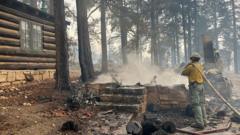As wildfires continue to rage across Canada and the northern United States, air quality alerts have been declared, particularly affecting Ontario and parts of the Midwest, with rising alarms regarding public health and environmental safety.
Air Quality Alerts Triggered Across Canada and Northern US Due to Persistent Wildfires

Air Quality Alerts Triggered Across Canada and Northern US Due to Persistent Wildfires
Smoke from ongoing wildfires has prompted officials to issue air quality alerts, advising residents to stay indoors.
Air quality alerts have been put in place throughout Canada and the northern United States as thick smoke from rampant wildfires blankets vast areas. Environment Canada has warned that air quality has significantly deteriorated, especially in Ontario, where Toronto has seen some of the worst air in the world on Monday. Residents are being cautioned to minimize outdoor activities, with particular emphasis on vulnerable groups such as the elderly, pregnant women, and young children.
In the United States, similar alerts have been issued for Chicago, with guidance stressing that outdoor activities should be curtailed. The National Weather Service in Chicago noted that unhealthy ozone levels, combined with residual effects from Canadian wildfire smoke, prompted these warnings that will remain in effect through Tuesday evening.
Amidst this crisis, Prime Minister Mark Carney is scheduled to meet with emergency responders in Ottawa to evaluate the impact of the fires, which have already led to mass evacuations in Manitoba and Saskatchewan, displacing thousands of residents. The wildfires have become more intense in May and June, prompting local administrations to declare states of emergency.
As the smoke drifts across borders, political tensions have arisen. Last week, a group of six U.S. Congress members expressed their frustrations to the Canadian ambassador over the smoke’s disruption of summer activities. This spurred a response from Manitoba’s premier, who accused lawmakers of trivializing the severe impacts of the wildfires.
On the east coast, a rapidly expanding wildfire on the Bonavista peninsula in Newfoundland has doubled in size overnight, threatening multiple structures in the region. Scientists have linked the increasing frequency and intensity of wildfires to climate change, reporting that Canada is warming at a rate approximately double the global average, with its Arctic areas experiencing even more drastic changes.



















